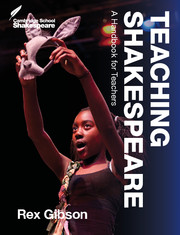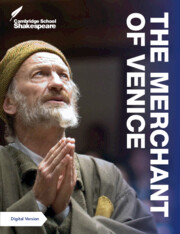Teaching Shakespeare
Overview
Teaching Shakespeare has been a major contribution to the knowledge and expertise of all teachers of Shakespeare from primary upwards for two decades. This full-colour second edition is in a larger format, updated to reflect modern classroom practice. It includes new contributions by leading practitioners from Shakespeare’s Globe, the Shakespeare Schools Festival, the Shakespeare Birthplace Trust and the Cambridge School Shakespeare editorial team. Teaching Shakespeare makes explicit the ‘Active Shakespeare’ principles which underpin Cambridge School Shakespeare and includes activities and advice to help teachers develop their existing good practice, making the learning of Shakespeare valuable and enjoyable for all involved.
Features
- Written by the late Rex Gibson, teacher and author who published well over one hundred articles and reviews on Shakespeare and teaching Shakespeare and was awarded the inaugural Shakespeare’s Globe Sam Wanamaker Award ‘for the most outstanding contribution by an individual or organisation to the world's knowledge of Shakespeare’.
- New foreword with contributions from leading practitioners including Shakespeare scholars Stanley Wells and Paul Edmondson, Fiona Banks of Shakespeare’s Globe and Ruth Brock and Dominic Fitch of the Shakespeare Schools Festival, adding their invaluable insights and experiences of teaching Shakespeare.
- An improved, larger-format edition with updated references and produced in an attractive new full-colour design with photographs throughout, with suggested activities and talking points clearly highlighted.
- Practical examples are given from the plays most frequently used in schools, with principles shown to apply across the Shakespearean canon.
Contents
- Foreword
- Introduction: Active methods
- Teaching Shakespeare: an overview
- 1. Why teach Shakespeare?: Abiding and familiar concerns
- Student development
- Language
- Otherness
- 2. Principles: Treat Shakespeare as a script
- Make Shakespeare learner-centred
- Shakespeare is social
- Shakespeare celebrates imagination
- Shakespeare is physical
- Make Shakespeare exploratory
- Address the distinctive qualities of the play
- Choice and variety
- Shakespeare and plurality
- Negative capability
- Shakespeare is about enjoyment
- 3. Perspectives: Feminism
- Psychoanalysis
- Structuralism
- Deconstruction
- Political perspectives
- Reception theory
- Using perspectives
- 4. Shakespeare's language: Introduction
- Dramatic language
- Imagery
- Personification
- Antithesis
- Repetition
- Rhyme
- Lists
- Verse
- Prose
- Rhetoric
- Bombast
- Hyperbole
- Irony
- Oxymoron
- Puns
- Malapropism
- Monosyllables
- Pronouns
- Changing language
- Inventing language
- Everyday language
- Two types of language
- The development of Shakespeare's language
- The Sonnets
- 5. Story: The Story of the play
- Enacting the story
- Stories in the play
- Recapitulating the story
- Point of view narratives
- Ariel's story
- 6. Character: Introduction
- Fundamental questions
- Complexity of character
- Language and character
- Introduction to activities
- Cast the play
- Job interviews
- Absent characters
- This is your life
- Obituaries
- Point of view
- Hot-seating
- Public and private
- Props
- Free-wheeling associations
- List of characters
- Ranking characters
- Journeys through the play
- Relationships
- Exploring character
- Character types
- Character names
- 7. Themes: Introduction
- Four common themes
- Levels
- Particular themes
- Fathers and daughters
- Acting and theatre
- 8. Stagecraft: Introduction
- Stage directions
- Critical incidents
- Creating atmosphere
- Opening scenes
- 9. Active methods: Content
- The teacher's role
- Organising the classroom
- Introduction to activities
- Acting a scene
- Beginning the play
- Sense units
- Speaking Shakespeare
- Teacher leading
- Five investigations
- Sections and headlines
- Student as director
- Point of view: theory
- Improvisations
- Warm-ups
- A memory game
- Tableaux
- Chroal speaking
- Insults
- Using films
- Trials and inquiries
- Writing and design
- Sequencing
- Shakespeare's life and times
- Theatre visits
- Staging a Shakespeare play
- Shakespeare festivals
- Researching the classics
- Other resources
- 10. Shakespeare for younger students: Introduction
- Shakespeare's life and times
- Storytelling
- Dramatic storytelling
- A co-ordinated approach across the curriculum
- A Shakespeare term
- A puppet Macbeth
- 11. Assessment: Process or product? Principles
- Student self-assessment
- Assessment of performance
- Essays
- Assessment tasks
- Examinations
- Evaluating a lesson
- Quotations used in the text
- Index
Brighter Thinking Blog
Keep up to date with the latest classroom tips and educational trends from our brighter thinkers.
Visit the blogCatalogues and Ordering
Looking for something in particular or just browsing? View our catalogues to see our full range of print and digital books.
View and downloadAdvice on useful tools
Advice on useful tools, activities and timetabling from teachers experiencing school closures.
Cambridge GO
All our supporting resources have now moved to Cambridge GO – the new home for your Cambridge digital content.
Listen to our podcast
Listen to our podcast to discover teaching inspiration & advice from leading educational thinkers.








